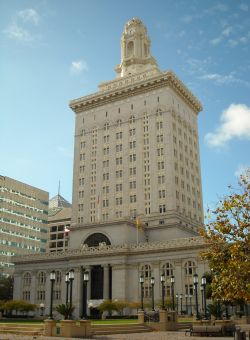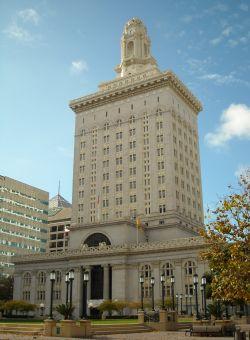
Photo by Daniel Ramirez
Related Article
Oakland Faces Arts Funding Emergency
June 10, 2011
The Oakland City Council has approved a $387 million general fund budget. How they’ve done it remains partly a mystery and there are many questions that still need to be resolved.
But for the moment, the news is this: The arts are saved. There will be no cuts to funding. However, there will be layoffs in all city departments, save for police and firemen.
Seventy-two hours ago, the situation seemed a little more dire. The city council looked to be on the verge of passing a budget that demanded that the nationally recognized, 26-year-old arts funding program take a 15 percent cut — out of its $720,000 budget. That was actually a relatively modest hit. Under one of the original proposals the funding program would have been ‘zeroed out’. Under another proposal the program would have been cut by 50 percent.
“Nothing is fixed in stone,” Margo Dunlap noted on Wednesday. She is executive director of Pro Arts, the Oakland Cultural Trust. “The problem is that any budget is the sum of projections and no one knows just how accurate those are. Also, when the cuts come down from the state on redevelopment, it’s going to pull the rug out of this whole budget.”
She was exactly right. And now a mystery: How will this budget look after all the state and federal cuts have been realized, including the end of the state’s support for local redevelopment agencies?
The budget deal reached on Thursday was based largely on both union givebacks and nonunion employee salary concessions including furloughs. The latter alone may amount to as much as 17 percent for nonunion employee compensation.
The backdrop for these cuts was set out on Tuesday night when the various constituencies came to present their cases. What emerged was a portrait of a city still clinging to the promise and optimism of Jerry Brown's mayorship but at the same time dealing with severe problems, particularly involving infrastructure. Unfixed roads and polluted sewers; lawsuits; outdated eight-year-old computers with no one to fix them and servers that don’t support new software. Not to mention the issues of public safety and pensions.
When the cuts come down from the state on redevelopment, it’s going to pull the rug out of this whole budget.“What I find hopeful,” Michael Fried, Executive Director of Cantare Con Vivo, said after Tuesday’s meeting “is that five out of the eight council members are willing to stand in support of more proportional sacrifices. “
But on Thursday night the best intentions fell away. In the battle to finish, according to Sanjiv Handa writing for the East Bay News Service, “Council members sniped at each other, made terse remarks, sharply queried city staff, and listened to a smattering of public comments for more than three hours…”
But in the end, even if only for the moment, the situation for the arts is resolved.
Fried, for one, believes the “cup is half full” and that what needs to be done now is “to establish a vision and then a broad coalition of people from the cultural trust, from the senior centers, from the library, from Parks and Rec, who can work together and come up with innovative ways to augment a shrinking general fund.”
Part of the reason the city council has become more open to supporting the arts, says Fried, is that it’s becoming apparent that the arts are a much greater source of income to the city than one might have thought. Some estimates put the arts GDP in the city at around $70 million a year, which in turn generates $3 to $4 million in tax revenue.
“But also,” Fried says, “it’s becoming clear that the arts are essential to the 21st century economy. Look at companies like Apple, Pixar, Pandora, and Facebook. This is a completely new sector based largely on storytelling platforms.”
“If the arts not part of every school experience we will be a third world economy because the arts are about creativity and problem solving. They’re what give children their mathematical literacy and the basis on which to think critically. You have to remember the legacy of this city. It was once known as 'the Athens of the West.'” [Actually, that was Lexington, Kentucky, and then every college town between there and Berkeley, but the idea is the right one — Editor]

